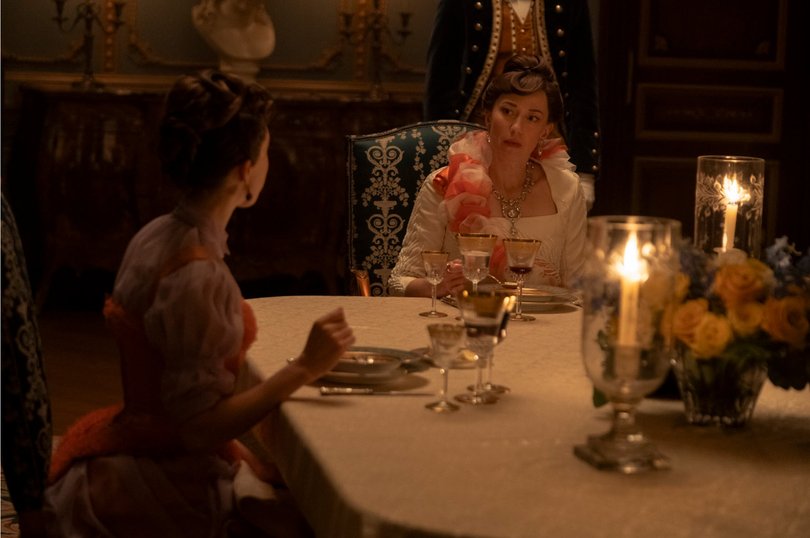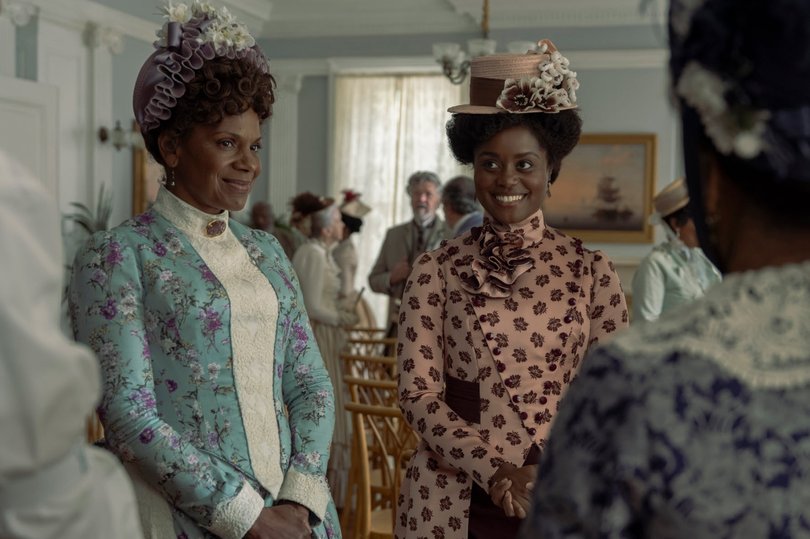In its third season, ‘The Gilded Age’ is as staid and sudsy as ever

The Gilded Age, by virtue of its focus on moneyed late-19th-century decorum, is the current HBO drama that hews most closely to network broadcast standards.
Indeed, the show was originally tipped for NBC before it got a Bertha Russell-approved status glow-up to the premium cable streamer in the US.
But while it eschews the brutality of HBO’s reputation-burnishing series such as The Sopranos or Game of Thrones, it induces similar ethical cartwheels in the viewer.
Sign up to The Nightly's newsletters.
Get the first look at the digital newspaper, curated daily stories and breaking headlines delivered to your inbox.
By continuing you agree to our Terms and Privacy Policy.We’re invited to cheer the victories of an amoral robber baron and his Machiavellian wife, whose campaign to conquer the old-money battlements of 1880s New York forms the overarching narrative of the series.
New-money power couple George and Bertha Russell are a rare match for their station and era, having married for love.
As seductively embodied by Morgan Spector and Carrie Coon — the latter an Emmy nominee for her role last season — they’re also a rare match in casting.

In the series’ eight-episode third season, the Russells’ enviable union is tested by a split over the fate of their 18-year-old daughter, Gladys (Taissa Farmiga, still something of a charisma void for all the screen time she gets).
Bertha is determined to make their girl a duchess by marrying her off to a dull British nobleman (Ben Lamb), one who’ll need the dowry George is offering to keep his family’s centuries-old estate humming along.
This much-negotiated purchase is but one of the financial pressures hovering over George’s immaculately bearded head.
As he seeks to acquire a series of mines in Arizona, he’ll need to realise his ambition of building the nation’s first coast-to-coast railway.
Though it’s been 18 months since the prior season concluded, the new one chugs along as though no time has passed, swinging from last season’s many dangling plot threads.
Besides the question of whether Gladys will marry for love or position, there’s also a bizarrely oversized subplot about footman Jack’s patent-pending new creation, the alarm clock. (So, so many scenes about that infernal clock.)
But making us cheer the kid’s life-changing invention, one that would bring bleary-eyed misery to untold millions in the century-plus that followed, is just another of showrunner Julian Downton Abbey Fellowes’s dirty tricks.
This is, above all, a show built on duos. Besides George and Bertha — you try not calling them George and Martha — there are Christine Baranski and Cynthia Nixon as the dowager Brook sisters, the latter’s well-meaning naivete continuously undercut by the former’s withering sarcasm.
Due to a sudden reversal late last season, Baranski’s Aunt Agnes, who owns the house in which they both reside, is now penniless while Nixon’s Aunt Ada has inherited her late husband’s previously unknown fortune.
This power shift has left the servants uncertain whose orders to obey — good heavens! — and given Ada the means to back causes she believes in, which now include the temperance movement, much to her sister’s chagrin.
The way women acquire and wield influence in this man’s man’s man’s world is the closest thing Fellowes and co-writer Sonja Warfield have to a governing theme.
In this, Coon’s magnificent Bertha has an analogue in Elizabeth Kirkland, a new character this season played by Phylicia Rashad — thrillingly cast against type as a hard-hearted character afflicted by prejudice.
Like Bertha, she meddles in the love life of her child (Jordan Donica, yet another musical theatre performer in a cast already bursting with them) — a dashing, Howard University-educated physician who treats journalist and budding novelist Peggy Scott (Denée Benton) for pneumonia, developing feelings for her once she’s on the mend. (Miraculous overnight recoveries from financial ruin and/or grave illness are one of the storytelling weaknesses Gilded Age partisans have already learned to forgive.)

As ever, the bejewelled dialogue, as spoken by a murderer’s row of Broadway stars, is as much of an attraction as Kasia Walicka-Maimone’s ornate costumes, Bob Shaw’s production design, and Regina Graves’s set decoration. (The faithful might rewind when Bertha explains to her sister why she typically changes her dress three and sometimes four times in the course of conducting a single day’s business.)
“When I bedecked myself in these gewgaws, I was looking forward to your coming home,” Kelli O’Hara’s Aurora Fane laments to her husband, who has asked her to divorce him.
It’s the same, suffocating propriety that causes George, when he really loses his temper with Bertha, to seethe, “You are as pristine as a Raphael fresco!”
Fellowes and Warfield are too skilled not to recognise when they’re having one of their characters — usually Bertha — speak the theme of the show aloud.
“Winning in business and winning in society are linked,” she tells her husband a quarrel that precedes that things-we-can’t-unsay blowout. “We are facing a very public defeat!”
Later in the season, she announces: “Men are forgiven for their indiscretions and women are punished. It’s not fair.”
And so it is not. One of the show’s most intriguing aspects is its principals’ complicated motives, particularly the way their self-dealing occasionally results in some accidental good.
By all but forcing her daughter to marry a man she barely knows, Bertha believes she is positioning Gladys for a life that will allow her to use her intellect to influence worldly affairs — an opportunity given to few women, as this show constantly reminds us, then or now.
The show also digs into the hypocrisy of divorced women being shamed and banished, and of Rashad’s character — a woman of high position in the Black society of Newport, Rhode Island — looking down on John Douglas Thompson’s successful, self-made pharmacist because he was once enslaved.
Finally, Blake Ritson’s Oscar Van Rhijn, the son of Baranski’s Agnes, must reckon with the public shame of having been hoodwinked out of his mother’s fortune and the private shame of being gay in the 1880s.
That’s a lot of priceless plates to keep spinning, but Fellowes and Michael Engler, who directed most of the season’s eight instalments, manage to make a virtue of all this manicured chaos.
“I don’t blame you for being ruthless,” George tells Bertha in a stretch that leaves their shared future uncertain. “I admire it. It’s what we share.” Fellowes and his collaborators have invited us to share it, too. What a scandal it would make if we dared to decline.
The Gilded Age, Season 3 premieres June 23 on Paramount+ in Australia.
